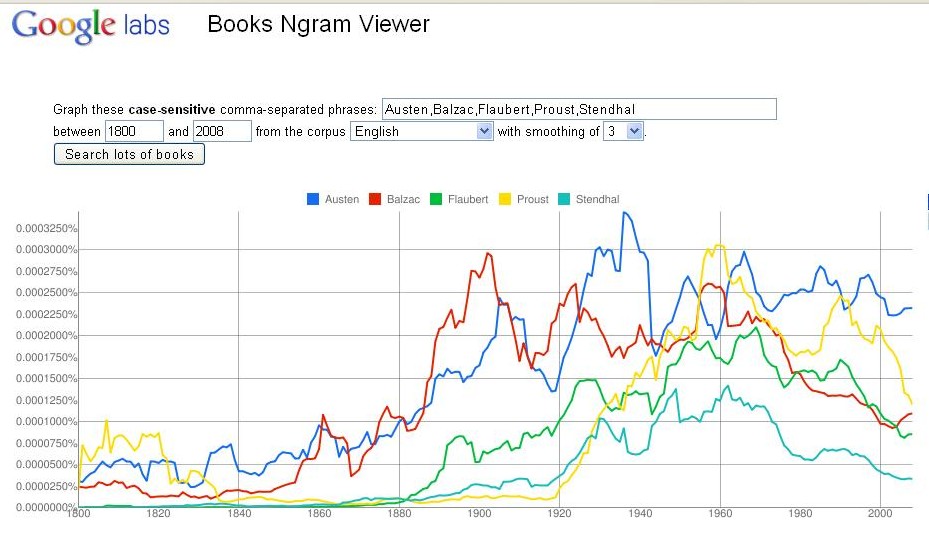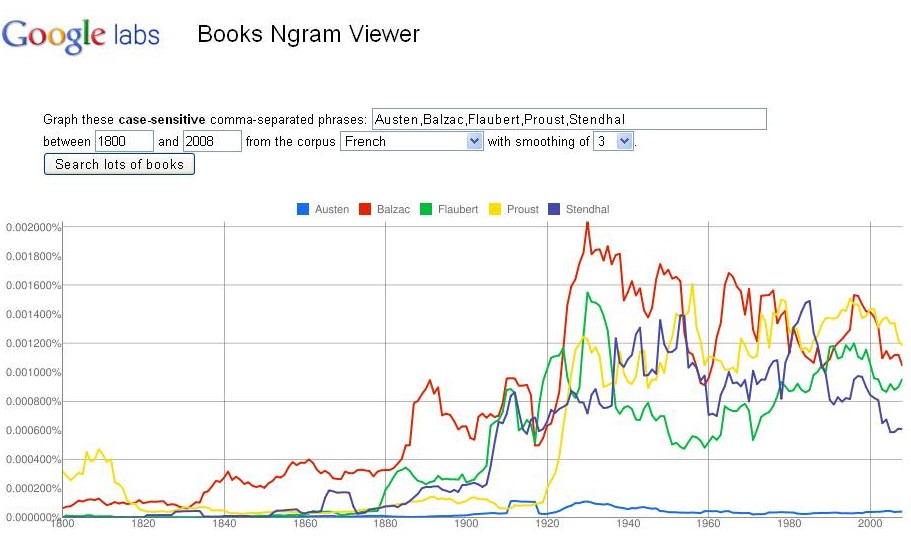April 27, 2011 by Nathaniel
Playing around with Google ngrams, you can undertake an analysis of key-words across all of the books scanned by Google. The graph analysis below shows the enduring popularity of Austen in the English language, compared to some French writers (Balzac,Flaubert,Proust and Stendhal):

Google Book Ngram for this Graph on selected authors
The graph becomes interesting when you compare these authors restricting the dataset to only French works. Proust is now the clear top referenced author, although Balzac was again as popular as in the English only dataset, Austen flatlines on the floor of Francophone culture. Not sure what this proves, but I’m tempted to carry out further research on all the Novelists on the list, just to determine the most referenced authors in the English and French language.


Posted in The List | Comments Off on Most mentioned authors since 1800
April 26, 2011 by Nathaniel
Thanks to all our voters for the new writers of the 21st Century.
Out of the seven proposed new novels, both Ned Beauman’s “Boxer Beetle”, and Evie Wyld’s “After the Fire, a Still Small Voice” gained the most with three votes each.
I’m told these two are good choices, although I have yet to read either of them.
I’m also starting to think that we should only have one selection out of the seven proposed novels – and will therefore select only one of these two works for the List of Novels – once I’ve finished reading them.
Posted in The List | Tagged After the Fire, Boxer Beetle, Evie Wyld, Ned Beauman, Results | Comments Off on Vote results on 21st Century New Writers
April 9, 2011 by Nathaniel
Test your knowledge of the List of Novels by trying the Facebook based Book Challenge List. Follow this link:
http://apps.facebook.com/booklistchallenge/List/?l=322
The average number of Novels selected from our list by our readers is currently 42.
Posted in The List | Tagged Book Challenge | Comments Off on Book Challenge List Test
April 2, 2011 by Nathaniel
In the postscript in this novel, Jean Echenoz states that he wants to destabilise the novel from within. He certainly has a talent for destabilising the reader. This novel is the story of two men who once loved the same women. However, they never realise this fact until the last. They have various adventures across the globe, one ending up in Malaysia and the other on the streets of Paris. Of the woman, Nicole, we now little and somehow towards the end of the novel, both this character and the reader all get dragged into a gangster film and action flick all in one. It certainly is very disconcerting, and not exactly enjoyable.
Yet this novel way of story telling owes more to the script writing of cinema. In fact Echenoz, when commenting this book, was quoted as saying:
“De la même façon que sur le plan de la mise en scène des récits, je me sers de la rhétorique cinématographique. Je fais appel instinctivement à des repères de l’ordre des outils poétiques, de la césure, de la syncope. Je pars d’un manuel de rhétorique ou de métrique pour importer telle ou telle figure.”
As the reader slowly tackles this difficult novel, the pace quickens and the style changes. As if the book was alive and dragging us through two, and sometimes three different stories. Echenoz sees the novel as an engine to automatically generate stories. Sometimes these motors become infernal machines over which even the author has no-control.
Posted in The List | Tagged Jean Echenoz, Review | Comments Off on Review of L’équipée malaise by Jean Echenoz
March 25, 2011 by Nathaniel
This site is always open to new writing, as Margaret Atwood says, new ways of using this story transmission device which most people know as the Novel.
The World Book Night event recently opened our eyes to some new up-coming literary talent, and some of these new writers need to be considered as potential candidates for the List of Novels you might want to read in your life-time if you get half the chance. This selection follows a BBC2 Culture Show special on 5 March 2011 with a judging panel which helped identify the 12 best new novelists in 2011. You can find an explanation of the selection criteria here:
http://www.bbc.co.uk/blogs/tv/2011/03/world-book-night-judges.shtml
Looking at all 12 of these novels, we’ve decided to concentrate on the best of the best, and ended up with the following first novels which are clear contenders, with all seven having the whiff of becoming timeless cult classics (we like bold statements on this site):
- Ned Beauman – Boxer Beetle,
- Adam Haslett – Union Atlantic,
- Samantha Harvey – The Wilderness,
- Rebecca Hunt – Mr Chartwell,
- Stephen Kelman – Pigeon English,
- Anna Richards – Little Gods,
- Evie Wyld – After the Fire, a Still Small Voice.
It is now up to you to decide which one of these seven books should end up on our List. One of these first novels, with the most votes by 26 April, could end up being considered a timeless classic.
This poll is now closed – you can have a look at the results by clicking on “Results” in the word-cloud.
Posted in The List | Tagged Adam Haslett, After the Fire, Anna Richards, Boxer Beetle, Evie Wyld, Little Gods, Mr Chartwell, Ned Beauman, Pigeon English, Rebecca Hunt, Samantha Harvey, Stephen Kelman, The Wilderness, Union Atlantic, Vote | Comments Off on 21st Century New Writers
March 25, 2011 by Nathaniel
Not so many voters this time on our list of dystopian novels. No wonder as it was such a downer.
However, the proposal to add the most “popular” dystopian novel to our “List of Novels you might want to read in your life-time if you get half the chance” has a winner:
– The Handmaid’s Tail by Margaret Atwood, with two votes.
A good choice – although I thought the prequel to Oryx and Crake The Year of the Flood was a really good read.
Posted in The List | Tagged Margaret Atwood, Results, The Handmaid's Tail | Comments Off on Vote result on Dystopian Novels
March 6, 2011 by Nathaniel
The List of Novels already contains More’s Utopia and Orwell’s 1984, two of the best examples of Utopias and Dystopias known to the literary canon. Others also on our list, such as Huxley’s Brave New World or Bradbury’s Farenheit 451, created the perfect world which soon turned into their own visions of hell on earth.
Nevertheless, we can go further into the depths of Dante’s Inferno and find other authors creating true warnings from history. I’m thinking of some of the clearest messengers of Distopias, such as the queen of the apocalypse Margaret Atwood and her trio of doomed societies, The Handmaid’s Tail, Oryx and Crake and the sequel to this latter’s depressing future world The Year of the Flood (Canada), you can also read Yevgeny Zamyatin’s We (a Russian author who may have inspired Huxley’s work and Vonnegut’s Player Piano), Vladimir Bartol’s Alamut (Slovenia), Ernst Junger’s novella On the Marble Cliffs (Germany), Sony Labou Tansi’s La Vie et demie (Congo), Kadare’s The Palace of Dreams (Albania), Ayn Rand’s Anthem (UK), Ursula Le Guin’s The Dispossessed: An Ambiguous Utopia (US) or Nikos Athanassiadis Î ÎÏα από το ανθÏώπινο (from Greece and only ever translated into French as Au-delà de l’humain).
Each visitor to this site has nine votes to select which of these fearful tales should we add to the List of Novels you might want to read in your life-time if you get half the chance?
This poll is open to everyone – so please tell your friends and family – please feel free to comment once you’ve made your choice.
This poll has now closed
Posted in The List | Tagged 1984, Alamut, Anthem, Ayn Rand, Bradbury, Brave New World, Ernst Junger, Farenheit 451, Huxley, Kadare, La Vie et demie, Margaret Atwood, More, On the Marble Cliffs, Orwell, Player Piano, Sony Labou Tansi, The Dispossessed: An Ambiguous Utopia, The Handmaid's Tail, The Palace of Dreams, Ursula Le Guin, Utopia, Vladimir Bartol, Vonnegut, Vote, We, Yevgeny Zamyatin | Comments Off on Dystopias and Utopias
March 5, 2011 by Nathaniel
Polling has now closed – Thanks to all our voters.
We have the results on the proposal to add some of the World Book Night selection of Novels to the List of Novels you might want to read in your life-time if you get half the chance:
Half of a Yellow Sun by Chimamanda Ngozi Adichie, received thirteen votes and was in first place.
Case Histories by Kate Atkinson,
A Life Like Other People’s by Alan Bennett,
Beloved by Toni Morrison,
were in equal second place with eleven votes each.
Since we had agreed that the top two novels in this poll would end up on our list, and based on these results, I propose to add these four books to our List of Novels.
Posted in The List | Tagged A Life Like Other People’s, Alan Bennett, Beloved, Case Histories, Chimamanda Ngozi Adichie, Half of a Yellow Sun, Kate Atkinson, Results, Toni Morrison | Comments Off on Vote Result for World Book Night Poll
February 22, 2011 by Nathaniel
In a sense the story is actually secondary to the literary work of Gailly. The chapters are set out in different phases, which relate to the different parts of the relationship between the two protagonists. Marguerite Muir, the dentist and hobby-pilot, who gets her hand-bag snatched in Paris, and Georges the older-man who finds her wallet in the gutter next to his car.  The narrative follows the internal thought process of both characters, sometimes stopping mid sentence, as if interrupted. At first Marguerite is almost chased by Georges, who behaves with some latent violence, only then does the stalker become the stalked as passions are born from chance encounters. Both are not certain that they want to continue down this inevitable road. As Gailly writes:
“Elle n’avait pas prévu qu’on lui volerait son sac à la sortie du magasin. Encore moins que le voleur jetterait le contenu dans un parking. Quant à Georges, s’il avait pu se douter, il ne se serait pas baissé pour le ramasserâ€.
This is a very Franco/French book, exploring human passions in a light comical way, but juxtaposing this to the requirements of a “normal†bourgeois life between Georges and his wife Suzanne. The latter almost becomes complicit in the affairs between Marguerite and George, which again is a very French way of dealing with a cheating husband. This Novel was made into a film called “Les Herbes Folles†by the Veteran Director Alain Resnais at the age of 87. An expensive production for a Franco/Italian co-production, like the book, the film failed to make any impression outside of France. It might be because of the comical ending involving flies undone in Marguerite’s plane.
Posted in The List | Tagged Alain Resnais, Christian Gailly, L'Incident, Les Herbes Folles, Review | Comments Off on Review of L’Incident by Christian Gailly
February 19, 2011 by Nathaniel
At only 76 pages, this novel was almost simply a pamphlet, telling the story of a woman’s decent into obesession following the end of a relationship. Of course, this “occupation” and invasion of her mind was not due to despair, but because of her incredible jealousy over the other woman.
This novel will not appeal to everyone, whilst reading it, I caught myself thinking Ernaux should just get a grip and get over her bloke “W”. Her work did in fact remind me of some past acquaintances, and lovers, drunk and flaling into the pit of jealous despair. It occupies your mind and can destroy you.
Posted in The List | Tagged Annie Ernaux, L'occupation, Review | Comments Off on Review of L’occupation by Annie Ernaux
« Newer Posts - Older Posts »


